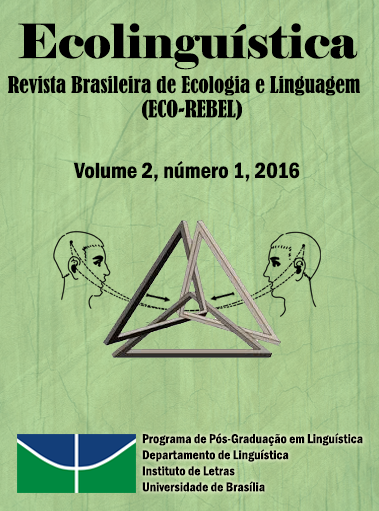When is the total not the whole?
Palavras-chave:
Nacionalismo; origem da linguagem; aquisição da linguagem; língua e mundo.Resumo
É possível que o maior mal-entendido sobre a importância do nacionalismo entre os encarregados do planejamento linguístico, especialmente os responsáveis pelo planejamento em língua-na-educação, possa ser uma causa subjacente para fracasso. A questão do nacionalismo junta dois domínios distintos ”“ o domínio de questões étnicas e culturais e o domínio da organização política. Além disso, o nacionalismo requer algum conhecimento do que seja língua e que papel ela desempenha. Definir língua começa pela discussão de sua origem ”“ de onde ela veio? A origem da língua é difícil de ser estudada devido à ausência de qualquer evidência direta, de modo que os estudiosos têm tido que tirar inferências de outros tipos de informação. Por exemplo, de registros fósseis, evidências arqueológicas, a grande diversidade de línguas vivas e os vários modos de comunicação dos animais, pássaros e insetos. A língua que usamos é moldada pelos falantes que compõem a sociedade. A diferença entre as línguas não está na gramática e no vocabulário, mas antes no mundo das metáforas.
Downloads
Referências
AMMON, U. English(es) and Academic Publishing. In C. Chapelle (Ed.) The Encyclopedia of Applied Linguistics. (10 Vols.) Hoboken, NJ: John Wiley, 2013.
ANDERSON, B. Imagined communities: Reflections on the origin and spread of nationalism. London: Verso, 1996.
BRUBAKER, R. Ethnicity without Groups. Cambridge, MA: Harvard University Press, 2006.
CHOMSKY, N. Syntactic Structures. Berlin: Mouton de Gruyter, 2002.
CHOMSKY, N. Aspects of the Theory of Syntax. Cambridge, MA: MIT Press, 1965.
GAL, S. & IRVINE, J. T. The boundaries of languages and disciplines: How ideologies construct difference. Social Research 62, 1995, p. 967-1001.
GLIEDMAN, J & CHOMSKY, N. Things No Amount of Learning Can Teach. Chomsky interview with John Gliedman. November 1983. Retrieved December 27, 2015, Omni, 6:11. https://chomsky.info/198311, 1983.
GORDON, R. G., Jr. (ed.). Ethnologue: Languages of the World (Fifteenth edition). Dallas, Texas: SIL International, 2005.
HALLIDAY, M. A. K. Language as Social Semiotic: The Social Interpretation of Language and Meaning. London: Edward Arnold, 1978.
_______. & R. Hasan. Language, Context and Text: Aspects of Language in a Social-Semiotic Perspective. Oxford: Oxford University Press, 1989.
KACHRU, B. B., KACHRU, Y. & SRIDHAD, S. N. (eds). Language in South Asia. New York; Cambridge University Press, 2008.
KAMWANGAMALU, N. Language Policy and Economics:The Language Question in Africa. London: Palgrave Macmillan, (forthcoming).
_______. Multilingualism and education policy in post-apartheid South Africa. Language Problems & Language Planning 21, 1997, p. 234”“253.
KAPLAN, R. B. A Metaphor is a many-splendored thing. In D. HOLLÓ, & K. KÁROLY (eds.). Inspirations in Foreign Language Teaching: Studies in Language Pedagogy and Applied Linguistics in Honour of Péter Medgyes. Harlow: Pearson Education, 2015, p. 222-242.
_______. I never metaphor I didn’t like. Applied Linguistics Interest Section of TESOL AL Forum, 2014, (5 pp. unnumbered.)
_______. Language management theory: From The Prague Circle to the present. Journal of Multilingual and Multicultural Development 32 (1), 2011, p. 85-93.
_______. English--the Accidental Language of Science? In U. Ammon (Ed.) The Dominance of English as a Language of Science: Effects on Other Language Communities. Berlin: Mouton de Gruyter, 2001, p. 3-26.
_______; BALDAUF, R. B. North Korea's Language Revision and Some Unforeseen Consequences. In O. Garcia and J.A. Fishman (eds.). Handbook of Language and Ethnic-Identity: The Success-Failure Continuum in Language and Ethnic Identity Efforts. New York: Oxford University Press, 2011.
KAPLAN, R.B., R. B. BALDAUF, JR., & N. M. KAMWANGAMALU. Why educational language plans sometime fail. In R. B. BALDAUF, Jr., R. B. KAPLAN, N. M. KAMWANGAMALU & P. BRYANT (eds.). Language Planning in Primary Schools in Asia. New York & London: Routledge, 2012, p. 1-20.
LARSON, B. Metaphors for environmental sustainability:Redefining our relationship with nature. New Haven: Yale University Press, 2011.
MÜHLHÄUSLER, P. Language of Environment, Environment of Language: A Course in Ecolinguistics. London: Battlebridge, 2003.
MÜLLER, F. M. The theoretical stage, and the origin of language. Lecture 9 from Lectures on the Science of Language. Reprinted in R. HARRIS (ed.). The Origin of Language (p. 7-41). 1996 [1861] Bristol: Thoemmes Press.
RENAN, E. Qu'est-ce qu'une nation? [What is a Nation?] Discours et Conferences. Paris: Caiman-Levy, 1887.
ROBERTSON, D. S. The new Renaissance: Computers and the next level of civilization. Oxford: Oxford University Press, 1998.
TRASK, R. L. Key Concepts in Language and Linguistics. Routledge: London and New York, 1999.
WEBER, M. La ville. Paris, La Découverte, 2014.
Youmans, M. Chicano-Anglo Conversations: Truth, Honesty and Politeness. Mahwah, NJ: Lawrence Erlbaum, 2007.
ZHOU, M. L. (ed.). Language Policy in the People’s Republic of China: Theory and Practice since 1949. Dordrecht & Boston: Kluwer Academic, 2004.
Downloads
Publicado
Como Citar
Edição
Seção
Licença
Autores que publicam nesta revista concordam com os seguintes termos:
Autores mantêm os direitos autorais e concedem à revista o direito de primeira publicação, sendo o trabalho simultaneamente licenciado sob a Creative Commons Attribution License o que permite o compartilhamento do trabalho com reconhecimento da autoria do trabalho e publicação inicial nesta revista.
Autores têm autorização para assumir contratos adicionais separadamente, para distribuição não exclusiva da versão do trabalho publicada nesta revista (ex.: publicar em repositório institucional ou como capítulo de livro), com reconhecimento de autoria e publicação inicial nesta revista.
Autores têm permissão e são estimulados a publicar e distribuir seu trabalho online (ex.: em repositórios institucionais ou na sua página pessoal) a qualquer ponto antes ou durante o processo editorial, já que isso pode gerar alterações produtivas, bem como aumentar o impacto e a citação do trabalho publicado (Veja O Efeito do Acesso Livre).



3.png)



